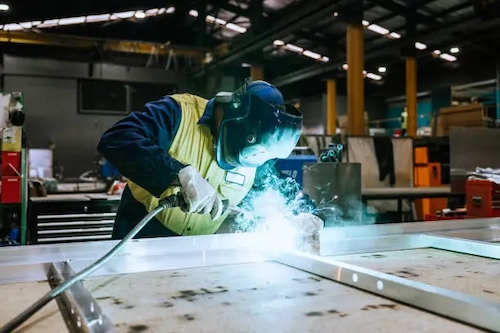Choosing the Right Materials for Your Custom Metal Fabrication Projects

Every project has unique requirements, and understanding different metals’ properties helps make informed decisions.
Understanding Custom Metal Fabrication
Custom metal fabrication involves cutting, bending, and assembling metal parts to create a product tailored to specific needs—the choice of material impacts structural integrity, resistance to environmental factors, and overall aesthetics. Properly selecting metals ensures that the finished product meets performance expectations while remaining cost-efficient.
Key Factors in Selecting Metal Fabrication Materials
Several factors influence the selection of materials for custom metal fabrication projects. These include strength, corrosion resistance, weight, machinability, and cost. Michaels Sheet Metal evaluates these factors to determine the best metal for each project.
Common Materials Used in Custom Metal Fabrication
Different metals offer distinct advantages depending on the project requirements. Michaels Sheet Metal works with various metals, ensuring optimal results based on the intended application.
-
Steel
- 1. Mild Steel: Known for its affordability and strength, it is widely used in structural and industrial applications. It is easy to weld and fabricate but requires proper coating to prevent rust.
- 2. Stainless Steel provides excellent corrosion resistance and durability. It is commonly used in environments exposed to moisture, chemicals, or high temperatures. Stainless steel is ideal for architectural, medical, and food processing applications.
- 3. Galvanized Steel: Coated with a protective layer of zinc, galvanized steel resists rust and corrosion, making it suitable for outdoor and marine applications.
-
Aluminum
- Aluminum is lightweight, corrosion-resistant, and highly malleable. It is often used in aerospace, automotive, and construction applications where weight reduction is critical.
- The metal also provides excellent thermal and electrical conductivity, which is ideal for heat exchangers and electrical components.
-
Copper
- Copper is valued for its electrical conductivity, making it essential for wiring, electrical components, and plumbing applications.
- It also has antimicrobial properties, making it a preferred choice for medical and food-related industries.
Factors Affecting Material Selection
-
Project Requirements
- The function and location of the final product determine the best material choice. For instance, stainless steel is preferable for environments exposed to moisture, while aluminum is ideal for lightweight structures.
-
Strength and Durability
- Metals vary in tensile strength and resistance to wear and tear. Steel and titanium are beneficial for projects requiring high structural integrity, such as bridges and industrial machinery.
-
Corrosion Resistance
- Corrosion-resistant metals, such as stainless steel and aluminum, extend the lifespan of structures exposed to moisture, chemicals, or extreme temperatures.
-
Weight Considerations
- Lightweight metals, such as aluminum and titanium, improve energy efficiency in automotive and aerospace applications while maintaining strength.
-
Machinability and Workability
- Metals that are easy to cut, weld, and shape reduce fabrication time and cost. Mild steel and aluminum offer excellent machinability for various fabrication processes.
-
Cost-Effectiveness
- Budget constraints influence material selection. Michaels Sheet Metal helps clients balance performance and cost by recommending the most suitable metal for each application.
Importance of Surface Finishing in Custom Metal Fabrication The right surface finish enhances the performance and appearance of fabricated metal products. Standard finishing techniques include:
Get Started
For any questions or concerns, get in touch with our knowledgeable staff today. We would be glad to assist you!
Contact Us Today- 1. Powder Coating: Provides a durable and aesthetically pleasing finish while improving corrosion resistance.
- 2. Anodizing: Commonly used for aluminum, anodizing increases surface hardness and enhances resistance to wear and corrosion.
- 3. Electropolishing: Used for stainless steel to remove imperfections and create a smooth, clean surface.
- 4. Plating: Adds a protective metal layer to improve corrosion resistance and conductivity.
Environmental Considerations in Metal Selection Michaels Sheet Metal prioritizes sustainable fabrication practices by selecting eco-friendly materials. Recyclable metals such as aluminum and steel reduce environmental impact while maintaining performance. Energy-efficient fabrication processes further contribute to sustainable manufacturing.
Applications of Custom Metal Fabrication Custom metal fabrication is essential in various industries, including:
- 1. Construction: Structural beams, roofing, and support frameworks rely on durable metal components.
- 2. Automotive: Lightweight metals enhance fuel efficiency and vehicle performance.
- 3. Aerospace: High-strength materials ensure safety and durability in extreme environments.
- 4. Medical: Corrosion-resistant metals support the production of surgical instruments and implants.
- 5. Industrial Manufacturing: Custom metal parts improve machinery performance and longevity.
Choosing the right materials for custom metal fabrication projects requires careful consideration of strength, corrosion resistance, weight, machinability, and cost.
Michaels Sheet Metal provides expert guidance to ensure clients select the best metals for their applications.
Start your custom metal fabrication project with the right materials by contacting Michaels Sheet Metal for professional advice and quality fabrication services.